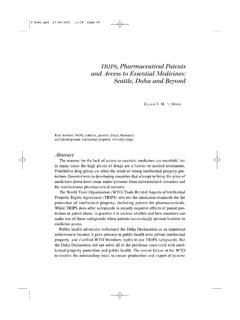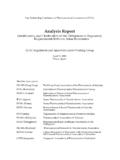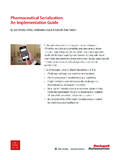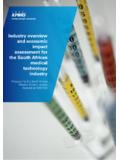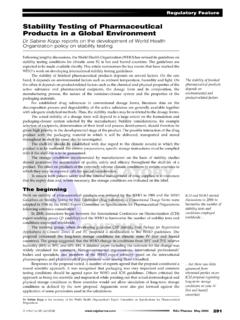Transcription of CONSTITUTIONAL COURT OF SOUTH AFRICA - …
1 CONSTITUTIONAL COURT OF SOUTH AFRICA Case CCT 201/14 In the matter between: PRESIDENT OF THE REPUBLIC OF SOUTH AFRICA First Applicant MINISTER IN THE PRESIDENCY Second Applicant DIRECTOR-GENERAL IN THE PRESIDENCY Third Applicant MINISTER OF HEALTH Fourth Applicant DIRECTOR-GENERAL OF THE DEPARTMENT OF HEALTH Fifth Applicant and SOUTH AFRICAN DENTAL ASSOCIATION First Respondent HOSPITAL ASSOCIATION OF SOUTH AFRICA Second Respondent Neutral citation: President of the Republic of SOUTH AFRICA and Others v SOUTH African Dental Association and Another [2015] ZACC 2 Coram: Mogoeng CJ, Moseneke DCJ, Cameron J, Froneman J, Khampepe J, Leeuw AJ, Madlanga J, Nkabinde J, Tshiqi AJ, Van der Westhuizen J and Zondo J Decided on: 27 January 2015 Summary: Section 167(6) of the Constitution direct access application to declare invalid and set aside President s Proclamation review of exercise of public power 2 National Health Act 61 of 2003 sections 36 to 40 decision to bring provisions into operation premature rationality review ORDER On application for direct access: 1.
2 Direct access is granted. 2. Proclamation 21 of 2014 is declared invalid and set aside. 3. There is no order as to costs. JUDGMENT THE COURT : Introduction [1] This is an application for direct access in terms of section 167(6)(a) of the The matter concerns the premature promulgation of a proclamation bringing certain sections of the National Health Act2 into operation. 1 Section 167(6) provides: National legislation or the rules of the CONSTITUTIONAL COURT must allow a person, when it is in the interests of justice and with leave of the CONSTITUTIONAL COURT (a) to bring a matter directly to the CONSTITUTIONAL COURT ; or (b) to appeal directly to the CONSTITUTIONAL COURT from any other COURT . Rule 18 of the Rules of the CONSTITUTIONAL COURT provides: (1) An application for direct access as contemplated in section 167(6)(a) of the Constitution shall be brought on notice of motion, which shall be supported by an affidavit, which shall set forth the facts upon which the applicant relies for relief.
3 (2) An application in terms of subrule (1) shall be lodged with the Registrar and served on all parties with a direct or substantial interest in the relief claimed and shall set out THE COURT 3 [2] The President, the Minister in the Presidency, the Director-General in the Presidency, the Minister of Health and the Director-General of the Department of Health (the applicants) maintain that the President s decision to bring the provisions into operation was made in error and was therefore irrational in law. They seek an order declaring the Proclamation3 invalid and setting it aside. The SOUTH African Dental Association (SADA) and the Hospital Association of SOUTH AFRICA (HASA) are cited as respondents in this matter. They support the relief sought by the President. Indeed, it was SADA who brought the alarming situation that necessitates this application to the attention of the Presidency.
4 (a) the grounds on which it is contended that it is in the interests of justice that an order for direct access be granted; (b) the nature of the relief sought and the grounds upon which such relief is based; (c) whether the matter can be dealt with by the COURT without the hearing of oral evidence and, if it cannot, (d) how such evidence should be adduced and conflicts of fact resolved. (3) Any person or party wishing to oppose the application shall, within 10 days after the lodging of such application, notify the applicant and the Registrar in writing of his or her intention to oppose. (4) After such notice of intention to oppose has been received by the Registrar or where the time for the lodging of such notice has expired, the matter shall be disposed of in accordance with directions given by the Chief Justice, which may include (a) a direction calling upon the respondents to make written submissions to the COURT within a specified time as to whether or not direct access should be granted; or (b) a direction indicating that no written submissions or affidavits need be filed.
5 (5) Applications for direct access may be dealt with summarily, without hearing oral or written argument other than that contained in the application itself: Provided that where the respondent has indicated his or her intention to oppose in terms of subrule (3), an application for direct access shall be granted only after the provisions of subrule (4)(a) have been complied with. 2 61 of 2003. 3 Proclamation by the President of the Republic of SOUTH AFRICA 21 of 2014: Commencement of Certain Sections of the National Health Act 61 of 2003, GN 21 GG 37501, 31 March 2014 (Proclamation). THE COURT 4 Factual and legal background [3] On 21 March 2014 the President signed the Proclamation pursuant to section 94 of the National Health As its only purpose, the Proclamation brought sections 36, 37, 38, 39 and 40 of the National Health Act into operation on 1 April 2014.
6 Taken together, these sections criminalise providing health services without holding a certificate of need. The National Health Act authorises the Minister of Health (the Minister) to prescribe regulations regarding applications for, and the granting of, certificates of These regulations are not yet in place. [4] The consequence is that health service providers in SOUTH AFRICA are currently engaging in criminal conduct, as no individual or entity that provides health services is in a position to obtain the required certificate of need as long as the regulations have not taken effect. [5] The President approached this COURT directly to rectify He submits that the regulations, which do not yet exist, form an essential part of the legislative scheme. 4 Section 94 provides that the National Health Act takes effect on a date fixed by the President by proclamation in the Gazette.
7 See also section 81 of the Constitution. 5 Section 1 defines health services as (a) health care services, including reproductive health care and emergency medical treatment, contemplated in section 27 of the Constitution; (b) basic nutrition and basic health care services contemplated in section 28(1)(c) of the Constitution; (c) medical treatment contemplated in section 35(2)(e) of the Constitution; and (d) municipal health services. Section 36(1) proscribes the provision of health services absent the certificate of need. Subsection 2 thereof directs applications for this certificate to the Director-General in the prescribed manner subject to a prescribed fee . Section 37 provides that a certificate of need will be valid for a prescribed period . And most importantly, section 39(1) authorises the Minister to prescribe, through regulations, the requirements for the issuing of a certificate of need to individuals and various categories of entities.
8 Section 39(2) empowers the Minister, also through regulations, to prescribe fees and other processes in relation to the application for certificates of need. Lastly, section 40 makes non-compliance with section 36(1) a criminal offence accompanied by criminal sanctions. It follows that section 40 of the Act is currently enforceable against all health service providers. 6 The third applicant, the Director-General in the Presidency, deposed to the founding affidavit to the application for direct access on behalf of the President and the other applicants. As the President is the first applicant, this judgment will refer to the President when it is detailing the submissions of the applicants. THE COURT 5 [6] He submits that the untimely effect of the Proclamation was unintentional since it was promulgated in error. According to the President, he acted in good faith when he determined a date for the statutory provisions to take effect, but was led astray by his advisors mistaken counsel.
9 Had he been aware of the correct position, namely that the necessary regulations were still pending, he would have selected a later date. Thus the Proclamation should be reversed to allow the consultative process to run its course. Since the provision of health services is now proscribed, the issuing of the Proclamation was objectively irrational as a matter of law. [7] The President also maintains that the Proclamation is at odds with sections 1, 7, 8, 11, 27, 28 and 195 of the Accordingly, he asks this COURT to declare the Proclamation invalid in terms of section 172(1)(a) of the [8] SADA and HASA agree that this COURT is the proper forum to grant the relief and that the Proclamation should be declared invalid and set aside. Direct access [9] This COURT is generally reluctant to sit as a COURT of first and final Direct access is granted only if it is in the interests of justice to do In determining whether direct access is in the interests of justice, a range of factors is relevant, including 7 Section 1(c) of the Constitution provides for the supremacy of the Constitution and the rule of law.
10 Section 7(2) provides that the state must respect, protect, promote and fulfil the rights in the Bill of Rights. Section 8 provides that the Bill of Rights is applicable to all branches of government. Section 11 guarantees everyone the right to life. Sections 27 and 28 enshrine the right to access to health care for adults and the right to basic health care for children. Section 195 sets out the basic values and principles governing public administration including transparency and accountability. 8 Section 172(1)(a) provides: When deciding a CONSTITUTIONAL matter within its power, a COURT .. must declare that any law or conduct that is inconsistent with the Constitution is invalid to the extent of its inconsistency . 9 Brink v Kitshoff NO [1996] ZACC 9; 1996 (4) SA 197 (CC); 1996 (6) BCLR 752 (CC) at para 14. 10 Zondi v MEC for Traditional and Local Government Affairs and Others [2004] ZACC 19; 2005 (3) SA 589 (CC); 2005 (4) BCLR 347 (CC) at para 12.












